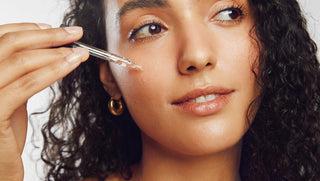Unveiling the Truth about Stress and Your Skin: Debunking Myths as Stress Awareness Month Wraps Up
As Stress Awareness Month draws to a close, it's important to reflect on the profound impact stress can have on our overall well-being, including our skin health. From breakouts to flare-ups, stress can manifest in various ways on our skin, leaving many of us feeling overwhelmed and unsure of how to navigate the challenges. But fear not! In this post, we debunk common myths and uncover the truths about how stress affects our skin, empowering you with strategies to maintain a healthy, radiant complexion even in the face of stress.
Myth #1: Stress Only Causes Acne:
While it's true that stress can exacerbate acne breakouts for some individuals, its effects on the skin extend far beyond pimples and blackheads. Stress can also trigger or worsen other skin conditions, such as eczema, psoriasis, rosacea, and even premature aging. Additionally, stress-induced inflammation can lead to increased sensitivity and redness, making existing skin issues more challenging to manage.
Truth #1: Stress Accelerates Aging:
Chronic stress can take a toll on our skin's aging process, leading to the premature formation of fine lines, wrinkles, and dullness. When we're stressed, our bodies release cortisol, a hormone that can break down collagen and elastin fibers—the building blocks of healthy, youthful skin. Over time, this can result in loss of firmness, elasticity, and overall skin resilience.
Myth #2: Stress Cannot Be Managed:
While it may feel overwhelming at times, stress is not an insurmountable obstacle. There are numerous strategies you can employ to manage stress effectively and mitigate its impact on your skin. From mindfulness practices like meditation and deep breathing exercises to engaging in regular physical activity and prioritizing self-care activities, finding healthy coping mechanisms is key to maintaining both mental and skin health.
Truth #2: Stress Management Benefits Your Skin:
By actively managing stress, you can not only improve your overall well-being but also promote healthier, more radiant skin. Stress-reducing activities like yoga, tai chi, or spending time in nature can help lower cortisol levels and promote relaxation, leading to clearer, calmer skin. Additionally, prioritizing sleep, maintaining a balanced diet, and seeking support from friends, family, or a mental health professional can all contribute to stress reduction and skin rejuvenation.
Navigating the Challenges:
Prioritize Self-Care: Make time for activities that nourish your body and soul, whether it's indulging in a relaxing bath, practicing meditation, or enjoying a hobby you love.
Stick to a Skincare Routine: Maintain a consistent skincare regimen tailored to your skin's needs, including cleansing, moisturizing, and applying sunscreen daily to protect against environmental stressors.
Get Adequate Sleep: Aim for 7-9 hours of quality sleep each night to allow your skin to repair and regenerate, promoting a healthy, glowing complexion.
Seek Support: Don't hesitate to reach out for support from loved ones or a mental health professional if you're feeling overwhelmed by stress. Remember, you're not alone, and there are resources available to help you navigate life's challenges.
Conclusion:
As Stress Awareness Month comes to a close, let's commit to prioritizing stress management and taking proactive steps to care for our skin from the inside out. By debunking common myths and embracing the truths about how stress affects our skin, we can empower ourselves to maintain a healthy, radiant complexion despite life's inevitable ups and downs. Remember, self-care is not selfish—it's essential for both mental and skin health. Here's to a stress-free, glowing future ahead!



Robin Brandy
I want to schedule a facial.